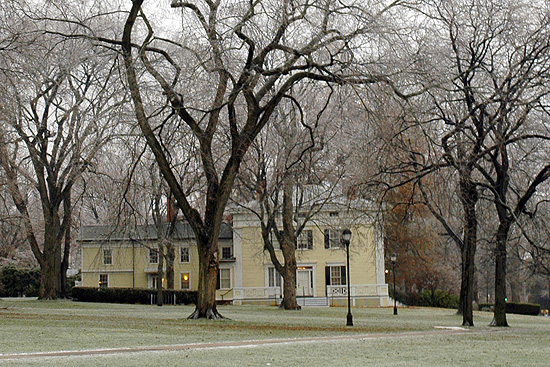Wesleyan Meets Mellon Foundation Challenge to Endow Fellowships in the Humanities at the Center for Americas
 |
| Wesleyan has secured a permanent endowment that will support the Mellon Postdoctoral Fellowship Program at the Center for the Americas. |
| Posted 02/01/08 |
| In 2004, the Andrew W. Mellon Foundation challenged Wesleyan to raise $1.5 million over a three-year period. Wesleyan agreed — and recently succeeded.
As part of the challenge, the Mellon Foundation matched these funds to endow a permanent Postdoctoral Fellowship Program in the humanities within the Center for the Americas. Since 1998, postdoctoral fellows were hired on a year-to-year basis as grant funding allowed. The Mellon Postdoctoral Fellowship Program has become part of the very rhythm of the Center for the Americas existence, and the endowment ensures its permanence at the heart of our operation, says Patricia Hill, professor of American studies and history. This means that exciting young scholars working at the cutting edge of their fields will continue to offer Wesleyan students the opportunity to encounter new knowledge in areas not routinely represented in our curriculum. The new endowment will support a two-person cohort and offer them opportunities for scholarly research and professional development. Their appointments, which begin in July 2008, are renewable for a second year. Faculty are already reviewing applications, and are seeking a cultural anthropologist or historian whose research focuses on indigenous peoples in North America and a cultural anthropologist or interdisciplinary scholar whose research examines cultural productions in Latin America, with a preference for a focus on Brazil or the Caribbean. In the past decade, Mellon Fellows have contributed to the Center for the Americas in substantial ways, Hill explains. Some have conducted research, sharing their findings with faculty colleagues and Wesleyan students. Others have organized the centers annual Americas Forum to address critical issues from a hemispheric vantage point. And yet other scholars have delivered audience-packed talks or participated in faculty colloquia. Staff in University Relations sought support from a variety of outside sources, especially from alumni and friends interested in investing in the intellectual life of Wesleyan, specifically the humanities and Center for the Americas. The opportunity to add to Wesleyans endowment attracted four trustees to make significant gifts to the challenge. “We are proud and pleased that our donors and the Mellon Foundation have joined together to once again support the comparative, interdisciplinary and international approach that encourages our students to explore the cultures and politics of the Americas in their hemispheric context, says Claire Potter, chair of American Studies, director for the Center for the Americas, and professor of American studies and history. The Mellon Postdoctoral Fellows have made invaluable contributions to our development of this comparative and hemispheric paradigm; the fellows have, in turn, thrived within the supportive structure and stimulating intellectual atmosphere at the Center for the Americas. The Mellon Postdoctoral Fellowship Program is designed to benefit the fellows and university alike. The fellows are offered intellectual interaction and professional development while on campus. Many of them gain their first teaching experience at Wesleyan, and others develop new pedagogical interests during the fellowship. Most go on to compete successfully for tenure-track jobs at prestigious institutions. Mellon Fellows have left Wesleyan familiar with a paradigm for the comparative study of the Americas that they could introduce at other institutions, Potter says. In addition, the fellows teach courses in their own areas of expertise, important fields that are currently not represented in regular university offerings. During the first year, each fellow will teach a small, research-related seminar and a larger lecture course that will offer students a broader understanding of the field. In the second year, each fellow will offer a self-designed course and team-teach a course with a comparative perspective. The endowment provides fellows with an annual stipend, health benefits and research and travel funds. They are given office space in the Center for the Americas. Our hope has always been to see the Mellon Postdoctoral Fellows create a vibrant intellectual community that supports young scholars, enrich the university curriculum, and contribute to the development of a hemispheric paradigm within the academy, Potter says. We believe that the program has exceeded the high expectations we had when we envisioned this productive, cooperative interaction between the fellows and the Center for the Americas, and we look forward to the next cohort of fellows to expand the impact of this successful partnership. Additional information on the Mellon Postdoctoral Fellowship Program is online at: http://www.wesleyan.edu/americas/cams/mellon_postdoc.html. |
| By Olivia Drake, The Wesleyan Connection editor |

